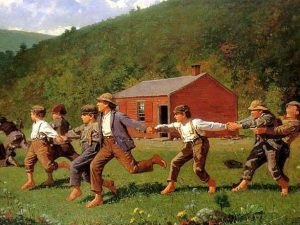Final Projects
Archived content. The NEH Summer Seminar “Why Literature Matters”
occurred from June 24-July 21, 2018.
 As much as this seminar emphasizes collaboration, its structure also privileges the very different challenges that each individual teacher faces when reading literature with his or her students. For this reason each participant will be expected to complete a pedagogical project dealing with a specific text or small group of texts. These projects will be uploaded to this site and on EDSITEment, The Best of the Humanities on the Web, the compendium of resources that the National Endowment for the Humanities provides for school teachers (edsitement.neh.gov). Finding ways to share with their students and other teachers some of the insights that Summer Scholars have garnered during the seminar sessions, as well as through individual thinking and research, is the primary goal of these projects.
As much as this seminar emphasizes collaboration, its structure also privileges the very different challenges that each individual teacher faces when reading literature with his or her students. For this reason each participant will be expected to complete a pedagogical project dealing with a specific text or small group of texts. These projects will be uploaded to this site and on EDSITEment, The Best of the Humanities on the Web, the compendium of resources that the National Endowment for the Humanities provides for school teachers (edsitement.neh.gov). Finding ways to share with their students and other teachers some of the insights that Summer Scholars have garnered during the seminar sessions, as well as through individual thinking and research, is the primary goal of these projects.
The form and content of each project will emerge from the goals and interests of its creator, who may choose to treat one of the literary texts that we have studied, though a Summer Scholar is not required to do so. Teachers planning their projects should therefore feel free to let their imaginations roam over the possibilities of new texts and new approaches that they would like to add to their curricula. Projects may be PowerPoints offering perspectives on particular topics, introductions to the teaching of a text or texts, as well as worksheets, creative exercises, and specific classroom activities. Each project should contain a research component that reflects the reading that the Summer Scholar has undertaken beyond that required for seminar discussions. Such components might include the results of the research done to support a particular approach to a text or even something as simple as an annotated list of sources that teachers presenting that text might want to consult. Summer Scholars are also encouraged to propose ways in which words and images might be combined as effective methods of teaching literary texts – in other words, visual materials are more than welcome. Applying to the concrete demands of the classroom what they have learned from nineteenth-century texts about why literature matters will be yet another way in which this seminar will put past and present into lively conversation with each other.
